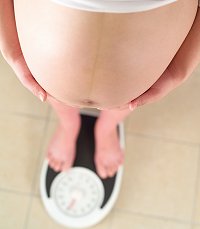 Trying to conceive? New research shows that couples using reproductive technology may have more difficulty in achieving a pregnancy if the father is overweight.
Trying to conceive? New research shows that couples using reproductive technology may have more difficulty in achieving a pregnancy if the father is overweight.
After allowing for several factors, such as the mother’s body mass index, every 5-unit increase in the father’s BMI was associated with a 28 percent decrease in successful pregnancy. This information was released in a study done by Dr. Zaher Merhi of Albert Einstein College of Medicine and Montefiore Medical Center in New York City. The study saw no difference in either sperm concentration or quality, and 3 day embryo quality was identical. There are plans to investigate the quality of 5 day embryos with further research.
The study was comprised of 251 fresh in vitro fertilization embryo transfer cycles, which were completed using a woman’s own eggs and her partner’s sperm. Overall, the study had a 37% success rate, with a lower rate in couples whose male partner had a BMI of 25 of greater. Those couples with an overweight male also had a female with a higher BMI and they also had more embryos transferred. Sperm concentration, the total number of motile sperm, and the percentage of men with low sperm count were all accounted for and disqualified in the study results. In addition, factors such as female BMI, female age, semen concentration, type of assisted reproductive technology, and number of embryos transferred were adjusted for. The only two factors that were found to have an effect on the outcome of the study were the increase in male BMI and the number of embryos transferred.
If further research has an identical outcome, counselors will need to counsel prospective fathers, as well as mothers, to lose weight before undergoing in vitro fertilization.
Also Read:
Health Effects of Pregnancy on a Woman’s Body
